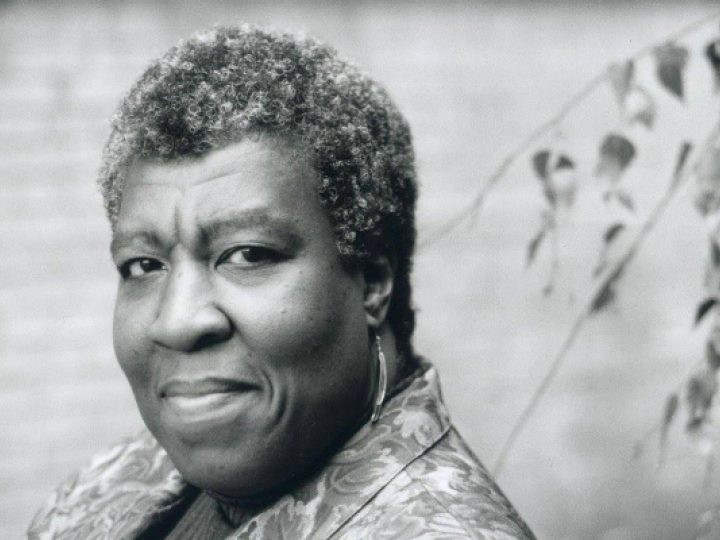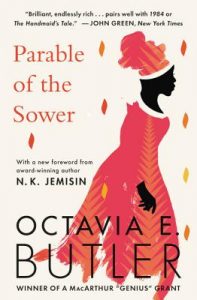Celebrating the Work of Octavia Butler with Lynell George
June 24, 2020

Photo by Cheung Ching Ming
Octavia Butler was a groundbreaking Hugo and Nebula Award-winning science fiction author whose imagined worlds continue to trouble, inspire, and delight. Her work deals with time travel, pandemics, wealth inequality, and alien planets, while never failing to deliver visionary explorations of language, race, gender, tribalism, societal norms, and alternative futures, in works that readers continue to turn to again and again. As we celebrate Octavia Butler’s birthday this week, we asked Lynell George, a Grammy-award winning writer based in Los Angeles, to share three reading recommendations from Butler’s oeuvre, along with an excerpt from her own forthcoming book on Butler’s life in and around Los Angeles, A Handful of Earth, A Handful of Sky: The World of Octavia E. Butler (Angel City Press, October 2020).
Excerpted from the chapter “Futurescapes & Keepsakes:”
“I’m often asked, especially of late, to entertain some version of this question: ‘As an African American woman writer, was Butler an influence on your own work?’ No. Not directly. I am not a writer because of her. I was already on a path. I was pulled to poetry and essays, long-form nonfiction rooted in our shared home town. However, she was absolutely on my radar. Traceable. Her life here in Southern California and her unique profile as a writer grappling with global issues, catastrophes, and human frailty through the lenses of science and speculative fiction was part of a far-ranging conversation—about sense of place, the environment and the necessity of pushing away borders and labels. Embodying what could be, she was a sturdy and singular model. Someone to look to for long-haul advice. For survival.
“‘Creativity demands that you spend long periods of time with your thoughts—all of your thoughts,’ she warned in a dashed off note-to-self—and by extension anyone who wanted to take this path. She struggled with her plots and premises as much as she struggled with perfectionism. She kept telling herself she belonged, until she carved a place out for herself and then made room for others to follow and to gather. By example she encouraged: Speak on what you’ve learned. Your take is valid. Essential. You absolutely deserve to be here. Full stop.”
Lynell George recommends:
This is the book I recommend to folks who say they don’t read speculative fiction/science fiction, because Butler is doing so much in this work. While the protagonist, Dana, slides through a seam of time (from 20th-century southern California to 19th-century antebellum Maryland), it’s not a book about time travel, but about how time bends—and how the unfinished demands to be addressed.

The first of the Parable series, this book peers eerily into our present—especially for many southern Californians—delving into climate change, wealth inequality, class divisions, and fraying and imploding social contracts. People would tell Butler she was prescient, but she would demur and say that she was simply paying attention.

I love this collection because it presents a range of her work in short form—essays and short fiction—and Butler comments in a free-standing text on each piece. Reading it is like sitting with her in conversation.

 Lynell George is an award-winning Los Angeles-based journalist and essayist. She has been a staff writer for both LA Weekly and the Los Angeles Times. She is the author of No Crystal Stair: African Americans in the City of Angels (Verso/Doubleday) and After/Image: Los Angeles Outside the Frame (Angel City Press). Her new book, A Handful of Earth, A Handful of Sky: The World That Made Octavia E. Butler, will be published in October 2020 by Angel City Press. Follow her on Twitter at @lynellgeorge.
Lynell George is an award-winning Los Angeles-based journalist and essayist. She has been a staff writer for both LA Weekly and the Los Angeles Times. She is the author of No Crystal Stair: African Americans in the City of Angels (Verso/Doubleday) and After/Image: Los Angeles Outside the Frame (Angel City Press). Her new book, A Handful of Earth, A Handful of Sky: The World That Made Octavia E. Butler, will be published in October 2020 by Angel City Press. Follow her on Twitter at @lynellgeorge.






